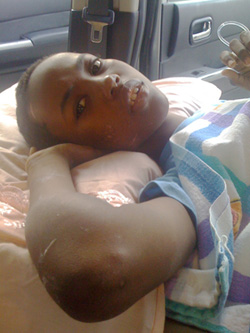
Roovens Monchil was under the rubble for several days, and even tossed into a pile of bodies outside the General Hospital in Port-au-Prince, before his father found him. His right leg was crushed and he had an open infected wound, but it wasn't until six days later that he was finally treated.
American aid doctors operated on his leg several times trying to clean out the infection, but there simply were not enough medical resources available, and Roovens was turning septic. In efforts to save his life, and hopefully his leg, Roovens was transferred to the USNS Comfort ship, and shortly after, airlifted to a hospital in the U.S., where he is on the road to a full recovery.
As part of the rebuilding of Haiti, the goal is sustainable health care improvements, so future patients like Roovens aren't doomed. We've heard the numbers: "We've raised X millions of dollars for Haiti and fed, clothed, provided shelter, medically treated, etc. X millions of people." However, the real results are found in the individual lives saved and the future lives that must be saved. International NGOs have raised over a billion dollars, but is their use of those funds going to build a sustainable Haiti?
Since the earthquake, my organization, MedShare, has provided almost 100 tons of medical supplies and equipment to hospitals and partnering NGOs. All the items we send are specifically requested to assist their operation needs. Many of these medical supplies were sent to meet the emergency medical needs after the earthquake, but our ultimate goal is to partner with the right people to help Haitians build sustainable health care in Haiti.
Haiti has the highest number of NGOs per capita than any country in the Western Hemisphere, and Haitians now have access to medical treatment that didn't exist before the earthquake. But yet the CDTI, one of the most modern hospitals in Port-au-Prince, had to close because of lack of funding. So THE question is: How will the money be used properly to build a sustainable Haiti?
We all know that for rebuilding to be successful, it must be sustainable. This means that the working goal should be for Haiti to be less dependent on foreign aid, so ultimately it has the least amount of NGOs per capita. The strength and resilience of the Haitian people throughout this disaster shows they have the will to triumph out of adversity. With the responsible leadership and fund allocation by both the government and the NGOs, Haiti can stand on its own.
Roovens is still in the U.S. recovering from his injuries, but through this he's discovered what he wants to be when he grows up. "I want to be a doctor," he said. I just hope there's a good health system in Haiti for Roovens to live out his dream.